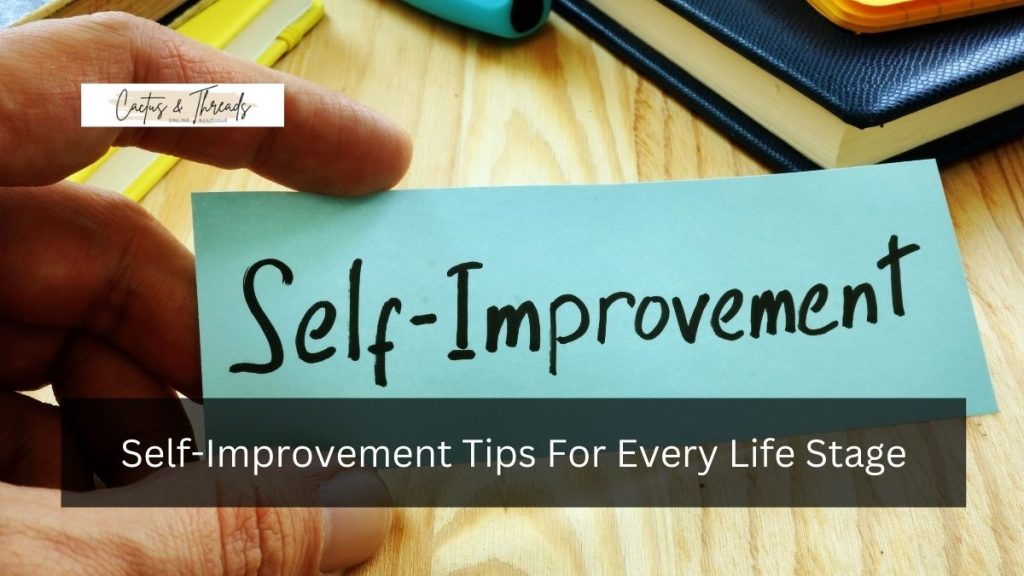
Self-improvement is an ongoing journey that evolves with every stage of life. From personal development in your 20s to embracing change and wellness in your 50s and beyond, each stage brings unique challenges and growth opportunities.
Here’s a comprehensive guide to achieving self-improvement across different life stages, complete with practical steps and advice.
Self-Improvement in Your 20s: Laying the Foundation
Your 20s are a time for exploration and building the foundation for the future. This is the ideal stage to develop self-awareness, set clear goals, and cultivate habits that will benefit you for years to come.
1. Build Strong Habits
Your 20s are when habits become lifelong routines. Establish positive practices like regular exercise, healthy eating, budgeting, and maintaining a work-life balance. Studies show that people who create these foundational habits in their 20s tend to carry them throughout life, leading to better mental and physical health.

2. Set Personal and Professional Goals
Goal-setting in your 20s helps clarify your path. Consider where you want to be in 5 to 10 years, both personally and professionally. Set SMART goals (specific, measurable, achievable, relevant, and time-bound) to guide you, and review your progress regularly. Taking actionable steps toward these goals can lead to significant long-term achievements.
3. Develop Self-Awareness and Emotional Intelligence
Self-awareness and emotional intelligence are invaluable skills. Engage in introspection, ask for feedback from mentors, and be open to growth. These skills help in building stronger relationships, improving career prospects, and fostering personal growth.
Self-Improvement in Your 30s: Strengthening Your Identity
Your 30s are about solidifying your identity and further developing a sense of purpose. This is a period when many people focus on career advancement, family building, and refining their personal values.
1. Invest in Career Development
In your 30s, your career often becomes a focal point. Whether through further education, certifications, or hands-on experience, invest in your professional growth. Networking, finding mentors, and expanding skill sets can all help position you for greater success.
2. Focus on Financial Planning
Financial stability becomes increasingly important in your 30s, as many begin to plan for major life milestones such as homeownership, starting a family, or saving for retirement. Creating a budget, reducing debt, building an emergency fund, and planning investments are essential steps for long-term security.
3. Strengthen Relationships
Personal relationships play a crucial role in happiness and fulfillment. Focus on strengthening relationships with family and friends, as these connections provide support and joy. Additionally, developing healthy communication skills with a partner can contribute to long-term relationship success.

Self-Improvement in Your 40s: Embracing Change
The 40s can bring significant life changes, including shifts in career, family dynamics, and health. Embracing these changes with an open mindset and flexibility is key to self-growth and satisfaction.
1. Prioritize Physical and Mental Health
In your 40s, health becomes an important focus. Regular physical activity, a balanced diet, and stress management techniques like yoga or meditation can improve overall well-being. Keeping up with regular check-ups and screenings is also essential for early detection and prevention of health issues.
2. Reevaluate Career Goals
Many people in their 40s consider career pivots or advancements. Reflect on your career satisfaction and goals, and don’t hesitate to pursue new opportunities if they align with your passions and expertise. A career shift or new leadership role can reinvigorate your professional life and boost motivation.
3. Embrace Change and Practice Resilience
Changes such as children growing up or parents aging can impact life dynamics. Building resilience helps you face these challenges head-on. Learning how to manage emotions, seek support when needed, and adapt to new circumstances can make transitions smoother and enhance emotional well-being.
Self-Improvement in Your 50s: Prioritizing Health and Purpose
Your 50s are a time to focus on health and life purpose. Many people seek fulfillment through hobbies, family time, or giving back to the community, as personal and professional priorities may shift.
1. Focus on Preventative Health
Preventive health is critical during this stage. Regular physical activity, a balanced diet, and medical check-ups help maintain physical health. Incorporating practices like strength training, stretching, and mindfulness can enhance mobility, reduce stress, and increase energy levels.
2. Deepen Personal Relationships
In your 50s, friendships and family connections provide joy and support. Prioritize these relationships by spending quality time with loved ones and nurturing connections. A strong social network has been shown to improve mental and physical health.
3. Rediscover Your Purpose
Many in their 50s seek new purpose, whether through hobbies, travel, or volunteering. Engage in activities that bring joy and satisfaction. Volunteering or mentoring can offer a sense of fulfillment by allowing you to share your knowledge and experience with others.
Self-Improvement in Your 60s and Beyond: Embracing Fulfillment
For many, the 60s and beyond are about contentment and giving back. Focusing on experiences, health, and relationships can make these years fulfilling and enjoyable.
1. Maintain Mental and Physical Wellness
Keeping both mind and body active is essential for well-being in your 60s and beyond. Physical exercise, balanced nutrition, and cognitive activities like puzzles, reading, or learning new skills can enhance quality of life and reduce age-related decline.
2. Enjoy Financial Freedom
If retirement is part of your plan, use this time to enjoy the fruits of your financial planning. Budget for hobbies, travel, or family activities. Regularly reviewing your finances ensures that you maintain stability while also enjoying life’s pleasures.
3. Leave a Legacy
Many in their 60s and beyond focus on their legacy. This can mean spending time with grandchildren, passing down family traditions, or even writing memoirs. For others, it’s about giving back, whether through donations or sharing expertise as a volunteer.
In Summary
Self-improvement is a lifelong journey, shaped by the changing priorities and challenges of each life stage. By focusing on health, relationships, financial stability, and personal fulfillment, you can experience continued growth and satisfaction, regardless of age.
Each phase offers a new opportunity to reflect, set goals, and cultivate the best version of yourself, leading to a life of resilience, fulfillment, and lasting happiness.
READ ALSO:







